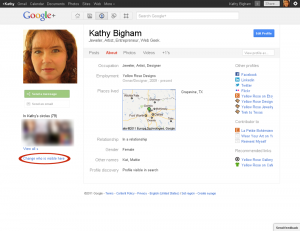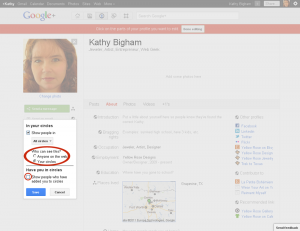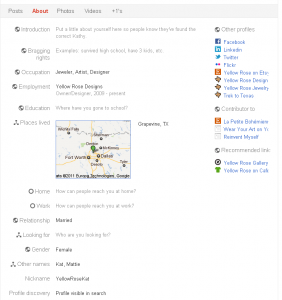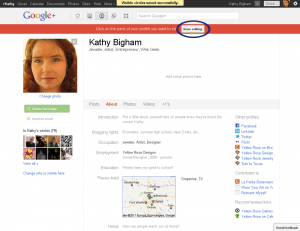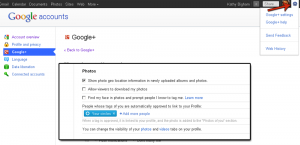Posts Tagged ‘privacy’
Alert: Google+ Security for Women
To all my female friends out there, I humbly apologize for not changing this setting sooner. Follow the screenshots below for how to keep these guys from finding and adding every other woman you know into their G+ circles. Let’s stop this madness together.
This next option is rather annoying to me to have to do because it also hides people who have added me from me as well. Feel free to also Uncheck “Show people in…” to hide everyone from everyone else. Personally, I have no problem if you’re already IN one of my circles seeing who the other people in my circles are as well. It’s worked out very well for helping people make connections on Facebook and Twitter.
If you’re extremely concerned about privacy, feel free to check the other settings on your Google+ profile here as well. You can edit most (I’ve discovered not all) of the options by clicking the globe in each section and setting individual privacy settings for your information. Or leave it blank if you want nothing to show up in those parts of your profile (My “looking for” is CLEARLY blank for a reason. That’s a hint, guys.)
You’re done!
Bonus privacy info:
Want to double check all your privacy and settings on Google+? Here’s a little extra info. Go to the “wheel” icon in the top right corner and click on “Google+ Settings”. There you’ll find Profile and Privacy, as well as additional Google+ notifications settings. And if you’re looking for how to block people from directly downloading your photos, it’s under the Google+ section at the bottom.
Editorial. My thoughts on the subject…
For me, this has become one of the biggest annoyances of Google Plus. It’s the very reason MySpace died as a potential player in the Social Media field and if it keeps up on G+, they run the same risk — at least in keeping women away. I’ve heard rumors of possible sites that showcase women’s G+ profile pics in some countries (and considering the number of men adding me from those countries, my best guess is the rumors are at least partially true). Exactly WHY men have suddenly developed an interest in “circling” women on Google Plus is beyond me – particularly when those women have “in a relationship” or “married” as their status. Are the women of Google Plus that much more interesting than a dating site, where you could, oh…. you know, meet someone who is LOOKING for a relationship? Or are you just that cheap that you don’t want to pay for such a service so you go looking at a free one instead? (Yeah, don’t bother trying to ‘zing’ me back with “women online are just that desperate”. I’ve SEEN the women you guys are circling and some of you are picking and choosing obviously based only on looks alone. Don’t go blaming ME for having pretty friends.)
Yes, I could hide my profile from searches. Yes, I could change my profile pic (I just might) or remove it altogether. I just don’t want to make the decision based on bully-tactics by men looking for romance. To me, that would be the same thing as accepting limitations on what I can do because of the acts of a few terrorists. I’m told this is a bad thing (and I’m starting to agree, but that’s another rant for another day). I choose not to hide my profile or restrict most of my privacy settings for a reason. Several reasons, in fact. I post at least 99% of my Facebook posts to “Public”. I allow sharing, commenting, etc. You can subscribe to me on Facebook, Like my Facebook page, follow me on Twitter, connect with me on Linkedin… all of which are linked from my Google Plus Profile. Yet, only on Google do I find myself having to repeatedly block men from seeing my profile. Is this a crack that Google security didn’t consider? What will it take to stop this behavior?
Facebook Faux Pas
 It’s been a week since Facebook made changes to their site that affected anyone with a “Fan Page.” We no longer have Fans, we have people who “Like” our pages. Users and page owners began noticing the change on April 20, the day before F8, the Facebook Developer’s Conference. Before the conference even began, and long before the keynote speech by Mark Zuckerberg and Bret Taylor, thousands of upset page owners began putting up pages and groups asking to bring the “Fans” back. One group alone had 3,000 new members within an hour. I not only understand their frustration, I felt it too. If we only have people who “like” our pages now, how are we supposed to recruit new Fans? Do we say, “Please like me!” and sound like we’re begging? Or, “Become a Liker”, which sounds . . . well, that just sounds a bit dirty. “Become a Fan” was easier to understand. Now page owners are scrambling to change websites, advertising campaigns and any outside references to Facebook. Not to mention, that now when someone “likes” a Facebook page, 1. their friends can no longer comment on it; and 2. if a friend “likes” that they liked it, that friend is suddenly a fan of the page too. Which, ok, is fine, in theory. Facebook figures if I “like” that they liked it, I would want to be a fan too. But I would rather not become a fan of pages like “Real women ain’t a size 0 … Real women have curves”, even though I might “like” that my male friends are fans of that page.
It’s been a week since Facebook made changes to their site that affected anyone with a “Fan Page.” We no longer have Fans, we have people who “Like” our pages. Users and page owners began noticing the change on April 20, the day before F8, the Facebook Developer’s Conference. Before the conference even began, and long before the keynote speech by Mark Zuckerberg and Bret Taylor, thousands of upset page owners began putting up pages and groups asking to bring the “Fans” back. One group alone had 3,000 new members within an hour. I not only understand their frustration, I felt it too. If we only have people who “like” our pages now, how are we supposed to recruit new Fans? Do we say, “Please like me!” and sound like we’re begging? Or, “Become a Liker”, which sounds . . . well, that just sounds a bit dirty. “Become a Fan” was easier to understand. Now page owners are scrambling to change websites, advertising campaigns and any outside references to Facebook. Not to mention, that now when someone “likes” a Facebook page, 1. their friends can no longer comment on it; and 2. if a friend “likes” that they liked it, that friend is suddenly a fan of the page too. Which, ok, is fine, in theory. Facebook figures if I “like” that they liked it, I would want to be a fan too. But I would rather not become a fan of pages like “Real women ain’t a size 0 … Real women have curves”, even though I might “like” that my male friends are fans of that page. ![]() I discovered F8 in my search to find out what had happened to our pages. If you want to see the keynote speech for yourself, as of now, it’s still available here: http://apps.facebook.com/feightlive/. The keynote itself is geared for developers, so be warned. Some interesting facts for Facebook users that have been misreported and misunderstood all over the web (and sparked some heated comments over at Mashable) – the changes to their policies.
I discovered F8 in my search to find out what had happened to our pages. If you want to see the keynote speech for yourself, as of now, it’s still available here: http://apps.facebook.com/feightlive/. The keynote itself is geared for developers, so be warned. Some interesting facts for Facebook users that have been misreported and misunderstood all over the web (and sparked some heated comments over at Mashable) – the changes to their policies.
- One step permission – From now on when someone wants to allow an application (that would be all those games that you play, quizzes, gift apps, etc) or a website that might use this in the future, you click “Allow” only once for the application developer to access your Facebook information. If you think about it, when you enjoy or trust a game or app, don’t you generally “Allow” it to access your Facebook information already? (If you’re not sure, you can check your account’s application settings. You might be surprised how many apps you’ve allowed access to your profile.)
- Removing the policy for developers, “You must not store or cache any data you receive from us for more than 24 hours. . .” What does this mean to users? Absolutely nothing. As a user, once you gave an app access to your information, they were allowed by Facebook to go and retrieve that information anytime they wanted. They just couldn’t keep it. The change is on the developer’s side only. Now they don’t have to ask Facebook’s permission to access your profile every time you play their game (Admit it! You know that’s almost every day!) And it is up to the developer to remove your information if you ever stop allowing them access. As a side-note, what I learned while chatting to developers during the keynote is that nearly every developer out there got around that policy anyway. If you ever allowed any unscrupulous developer access to your information even once, you may as well have given him access for life. Most of the developers out there are using your permissions only for what it was intended – for you to have access to their fun games and widgets.
- The third important item relates less to policy change and more to Facebook implementing a new feature for other sites outside of Facebook. We can now add the Facebook “Like” button to our sites, along with comments and other nifty little Social Plugin features. Does this mean I automatically have access to your Facebook information? No. I have no more access to your personal information on my site than I do if you become a Fan of my page. The only way sites have access to personal information is just like Facebook already uses: The user must allow the site access, through a secure Facebook-hosted application.
Quote directly from Facebook: “None of your data is shared with the site when you view social plugins. Social plugins pull information directly from Facebook and the site has no access to the data being displayed to you.”
Zuckerberg is clearly pushing the new “Like” button that Facebook has made available to other websites. If you want to see this in action, I’ve added a “Like” button to this blog and a “Like/Comment” button to my Supernatural page for Dean’s Amulet. So, yes, I can start to see where they were going with the new “Like” feature. Zuckerberg wants you to “Like” a particular restaurant or band. I want you to Like my blog and the products I sell on my site. ![]() I saw some page owners calling the change a “database grab”. Uh, hello? It’s their database. We’re just along for the ride. What Facebook did not consider were the implications the change would have to other people. Facebook now has 400 million users. Three-thousand of them jumping up and down
I saw some page owners calling the change a “database grab”. Uh, hello? It’s their database. We’re just along for the ride. What Facebook did not consider were the implications the change would have to other people. Facebook now has 400 million users. Three-thousand of them jumping up and down  about the “Fan” button probably aren’t going to make a very big wave. And that’s the biggest faux pas they could make. Facebook seems to care only about Facebook. Rolling out a significant change to the functionality of their site literally overnight, and with no mention of it other than in a conference for developers – in other words, obscure to most of their actual 400 million users – comes across as a cloak and dagger scheme. And this from a company who claims to be open about their policies. Open source for developers, maybe, but as secretive as Google when it comes to their users. Why is Facebook not out there announcing to its users what they’re doing and why? Why aren’t they telling them “No, we’re not going to start charging to use our site.”? (They aren’t.) Why aren’t they letting Page owners know in advance that something important is about to change on Facebook Pages? If I had seen the announcement about the “Like” button before suddenly discovering it on my page without warning, the transition would have gone much more smoothly. Facebook can’t seem to see the forest for all the 400 million trees. Their developers are busily rolling out changes (That weren’t ready to be rolled out. There were some serious errors on the Open Graph/Social Plugins documentation that weren’t corrected until almost 2 days after the conference, again, in cloak and dagger style.) without giving thought to all the possible scenarios or impact on the one thing that makes Facebook what it is – each of the 400 million users. Here’s hoping that by the time their next developer’s conference comes around, they’ve learned a very important lesson – People are what make “social interactions” happen. Not programs. Oh, and as for the question of how do I recruit new users to my Facebook Page? I simply ask you to Connect with Me.
about the “Fan” button probably aren’t going to make a very big wave. And that’s the biggest faux pas they could make. Facebook seems to care only about Facebook. Rolling out a significant change to the functionality of their site literally overnight, and with no mention of it other than in a conference for developers – in other words, obscure to most of their actual 400 million users – comes across as a cloak and dagger scheme. And this from a company who claims to be open about their policies. Open source for developers, maybe, but as secretive as Google when it comes to their users. Why is Facebook not out there announcing to its users what they’re doing and why? Why aren’t they telling them “No, we’re not going to start charging to use our site.”? (They aren’t.) Why aren’t they letting Page owners know in advance that something important is about to change on Facebook Pages? If I had seen the announcement about the “Like” button before suddenly discovering it on my page without warning, the transition would have gone much more smoothly. Facebook can’t seem to see the forest for all the 400 million trees. Their developers are busily rolling out changes (That weren’t ready to be rolled out. There were some serious errors on the Open Graph/Social Plugins documentation that weren’t corrected until almost 2 days after the conference, again, in cloak and dagger style.) without giving thought to all the possible scenarios or impact on the one thing that makes Facebook what it is – each of the 400 million users. Here’s hoping that by the time their next developer’s conference comes around, they’ve learned a very important lesson – People are what make “social interactions” happen. Not programs. Oh, and as for the question of how do I recruit new users to my Facebook Page? I simply ask you to Connect with Me. ![]()
“Facebook is a registered trademark of Facebook, Inc.”
